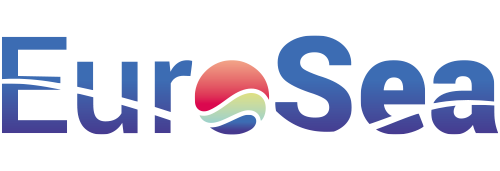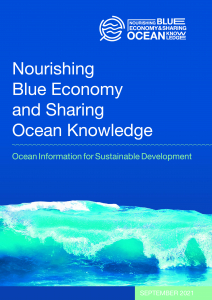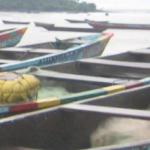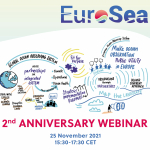Ten innovative EU projects to build ocean observation systems that provide input for evidence-based management of the ocean and the Blue Economy, have joined forces in the strong cluster ‘Nourishing Blue Economy and Sharing Ocean Knowledge’. Under the lead of the EuroSea project, the group published a joint policy brief listing recommendations for sustainable ocean observation and management. The cooperation is supported by the EU Horizon Results Booster and enables the group to achieve a higher societal impact. The policy brief will be presented to the European Commission on 15 October 2021.
The ocean covers 70% of the Earth’s surface and provides us with a diverse set of ecosystem services that we cannot live without or that significantly improve our quality of life. It is the primary controller of our climate, plays a critical role in providing the air we breathe and the fresh water we drink, supplies us with a large range of exploitable resources (from inorganic resources such as sand and minerals to biotic resources such as seafood), allows us to generate renewable energy, is an important pathway for world transport, an important source of income for tourism, etc.
The Organisation for Economic Cooperation and Development (OECD) evaluates the Blue Economy to currently represent 2.5% of the world economic value of goods and services produced, with the potential to further double in size by 2030 (seabed mining, shipping, fishing, tourism, renewable energy systems and aquaculture will intensify). However, the overall consequences of the intensification of human activities on marine ecosystems and their services (such as ocean warming, acidification, deoxygenation, sea level rise, changing distribution and abundance of fish etc.) are still poorly quantified. In addition, on larger geographic and temporal scales, marine data currently appear fragmented, are inhomogeneous, contain data gaps and are difficult to access. This limits our capacity to understand the ocean variability and sustainably manage the ocean and its resources.
Joining forces in Europe
Consequently, there is a need to develop a framework for more in-depth understanding of marine ecosystems, that links reliable, timely and fit-for-purpose ocean observations to the design and implementation of evidence-based decisions on the management of the ocean. To adequately serve governments, societies, the sustainable Blue Economy and citizens, ocean data need to be collected and delivered in line with the Value Chain of Ocean Information: 1) identification of required data; 2) deployment and maintenance of instruments that collect the data; 3) delivery of data and derived information products; and 4) impact assessment of services to end users.
To provide input to the possible future establishment of such a framework, ten innovative EU projects to build user-focused, interdisciplinary, responsive and sustained ocean information systems and increase the sustainability of the Blue Economy, joined forces in a strong cluster to better address key global marine challenges. Under the lead of the EuroSea project, the group translated its common concerns to recommendations and listed these in the joint policy brief ‘Nourishing Blue Economy and Sharing Ocean Knowledge. Ocean Information for Sustainable Management.’. Following up on these recommendations will strengthen the entire Value Chain of Ocean Information and ensure sound sustainable ocean management. In this way, the 10 projects jointly strive to achieve goals set out in the EU Green Deal, the Paris Agreement (United Nations Framework Convention on Climate Change) and the United Nations 2021-2030 Decade of Ocean Science for Sustainable Ocean Development. Toste Tanhua (GEOMAR), EuroSea coordinator: “It was great to collaborate with these other innovative projects and make joint recommendations based on different perspectives and expertise.”
Download the policy brief: [wpfilebase tag=file id=55 tpl=simple /]
Open in Zenodo (European Commission funded research repository): https://doi.org/10.5281/zenodo.5576120
Recommendations
1. Create a European Policy Framework for Scientific Ocean Observations Long-term Funding
Both continued observations and improved biological understanding are needed to capture the full range of ocean variability and assess oceanographic change, its ecological implications and potential impact on humanity. The observation and data delivery mechanisms need to be seen as research infrastructure, which require sustainable and adequate funding (as opposed to the often more volatile research funding) to support a growing blue economy through monitoring efforts. Ideally, the outcome would be a framework directive on ocean observations, that would ensure a sustainable support and better coordination of ocean observing and ocean information delivery efforts across Europe.
2. Support the Professionalisation of the Next Generation of ‘Blue Staff’
The growing Blue Economy needs more and more highly qualified and skilled professionals, with the Blue Digital Transformation also requiring new skills and competencies. Targeted training programmes for researchers should be supported. The next generation of “Blue Staff” should also be enriched by expanding EU efforts to increase participation of less equipped countries, attract more women, encourage young people, spread good scientific practices, facilitate exchange of personnel and attract new users to using infrastructures. This will increase employability in the both the academic and industrial marine sectors, ensuring sustainable exploitation of the value of the ocean.
3. Transform Data into Knowledge by Investing in IT Observations
The combination of different technologies, which collect different kinds of data, will enable to fill in gaps in knowledge and understanding of the Blue Sector dynamics in terms of ecology, biodiversity, sensitivity to climate change and the potential for sustainable exploitation of ocean resources. Therefore, it is crucial to develop emerging technologies that study and analyse the ocean in greater detail. This includes the integration of modular marine low-cost sensors to existing Earth Observation Systems, the promotion of Internet of Things, the exploitation of Artificial Intelligence and Machine Learning tools, and the promotion of European High Performance Computing emphasizing on cloud data storage.
4. Define Global Standards and Interoperability Practices
The oceanographic community is already developing data standardization and interoperability, but a more formalised framework is required. This will increase data quality levels and ensure more efficient and sustainable use of ocean data and information. A systemic approach towards interoperability and shared (cross-disciplinary) metadata policy is needed. It should not matter where you submit your data to be able to harvest and multiply its impact globally while keeping provenance tracked.
5. Strengthening Citizen Science for Policy, Equitable Access, Democratization and Critical Data Contributions
Citizen participation in decision-making should be considered a way to make the policy process more transparent and accessible. By actively supporting citizen science initiatives, policy makers can foster scientific education and appeal to a citizen’s natural willingness to contribute to society. Ultimately, marine observation science is made more democratic, and a new type of self-driven, sustainable and cost-efficient observatory concept is created. Mechanisms to provide feedback to citizens need to be put in place to showcase their impact and to further stimulate their engagement. Citizens must also be equipped with easy-to-use systems to collect and to upload/download data.
The policy brief ‘Nourishing Blue Economy and Sharing Ocean Knowledge. Ocean Information for Sustainable Development‘ will be presented to EU representatives at the EuroSea policy feedback meeting of 15 October 2021.
The policy brief ‘Nourishing Blue Economy and Sharing Ocean Knowledge. Ocean Information for Sustainable Development‘ was produced with the support of Trust-IT Services, provider of the Horizon Results Booster funded by the European Commission, Directorate General for Research and Innovation, Unit J5, Common Service for Horizon 2020 Information and Data. The projects that contributed to this document are indicated below. Project Group Leader: Toste Tanhua – EuroSea (contact).
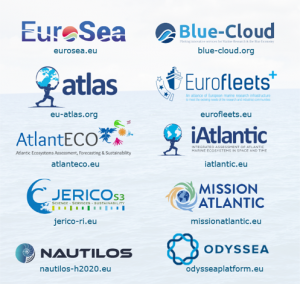
The ten EU-funded projects that join forces to build user-focused, interdisciplinary, responsive and sustained ocean information systems and increase the sustainability of the Blue Economy
These projects have received funding from the European Union’s Horizon 2020 (H2020) Research and Innovation programme under Grant Agreements: EuroSea 862626; AtlantECO 862923; Blue-Cloud 862409; EU-Atlas 678760; Eurofleets+ 824077; iAtlantic 818123; JericoS3 871153; Mission Atlantic 862428; Nautilos 101000825; ODYSSEA 727277.
